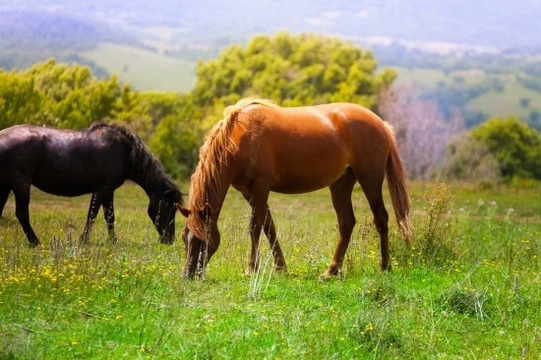
Caring for the Companion Horse
If you have just taken on a companion horse, there are lots of things you need to consider when it comes to caring for them. It's always a wonderful thing to do because not only does your horse get the company they need to stay happy, but you offer a home to a retired horse which is always something very worthwhile that has a real feel good"" factor about it.
However, an older retired companion horse still needs to be cared for and this includes making sure they are happy in their environment and healthy both in mind and body. Most people don't realise companion horses need just about as much care and attention as a working horse so it's important to take this on board before deciding to go down this route.
Getting the Right Companion Horse
It's also very important to make sure you choose the right companion horse ensuring they are a suitable choice for your horse. It's crucial they get on and that the retired horse doesn't end up getting bullied around. With this said there are many advantages which include the following:
- They keep a working horse company
- They can help separate two inseparable horses
- They are brilliant at keeping a youngster company
- They are great when it comes to keeping another older horse company in their retirement years
However, a good match needs careful consideration on various levels which includes the time you have to give them, their size, breed, sex because even older mares can be a problem when they come into season.
Older companion horses are a great choice for youngsters because they often provide the much needed steadying influence young horses need, but you have to be careful because youngsters are often quite boisterous which means the older companion might end up being continually harried.
Think About Their Dietary Needs
Life is made that much easier if both the companion horse and your own have the same or similar dietary needs. Having to deal with an overweight horse and a bad ""doer"" could prove challenging. Horses that can spend the same amount of time in a paddock means less stress for them and less work for you when it comes to figuring out how to manage things on a daily basis.
Questions You Need to Ask Yourself
There are several questions you need to ask yourself when choosing a companion horse which includes the following:
- Will the companion horse be okay when you take your horse away for events, to ride or any other reason?
- Would you need to bring them both in from the paddock to keep things sweet?
- Would the companion horse be okay when left alone in a stable when you are out on a ride, at an event or other?
The Routine Care a Companion Horse Needs
Just like any other horse, the companion would need to be given lots of regular attention. Horses like and enjoy human contact especially if they have worked all their lives and are now retired. This means knowing you have the time to do the following:
- That you have the time it takes to spend with the companion horse giving them the sort of attention they were used to in their working lives
- Grooming them regularly is essential because it allows you to bond with them and to check them over for any injuries, lumps and bumps. The more handling they get, the happier they will be
- Hoof care is another crucial factor that goes into keeping a companion horse. They may be able to go without shoes, but this does not mean their feet won't need regular trimming by a qualified farrier
- Making sure they regularly see the horse dentist is another essential. Older horses tend to suffer from tooth problems which should never be ignored or they will lose condition and fall sick all too quickly
- Vaccinations are essential even for the companion horse which includes tetanus which is a fatal condition that is luckily quite rare, but all horses still need to be vaccinated against it on an annual basis. Then there is the flu jab to think about and again this must not be overlooked!
What About Exercise?
Horses are designed to spend most of their time walking around and grazing which means they need to be turned out for longer periods during the day and night depending on the time of the year and weather conditions. For horses that are in good condition, 24 hour turnout is the ideal, but with this said, the modern horse's routine typically involves work and then being brought in overnight or for some time during the day which is something they quickly get used to.
A companion horse however, would not do that well if kept stabled for long periods unless of course, they are sick and need box rest or if the weather conditions turn particularly nasty. The thing to remember is that a companion horse would need to have daily exercise even if it is being turned out in an arena when the weather is bad.
Horses do like to be led out in hand and will normally walk alongside another horse pretty calmly. Where young horses are concerned, this is a superb part of their education.. However, you'd need to find out if the companion horse you choose will accept leading out with another horse or not. If they do, this is a great solution when it comes to giving them a change of scene and exercise!
""



